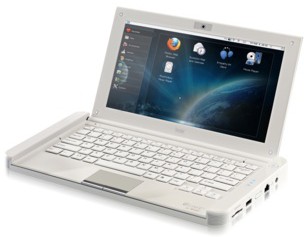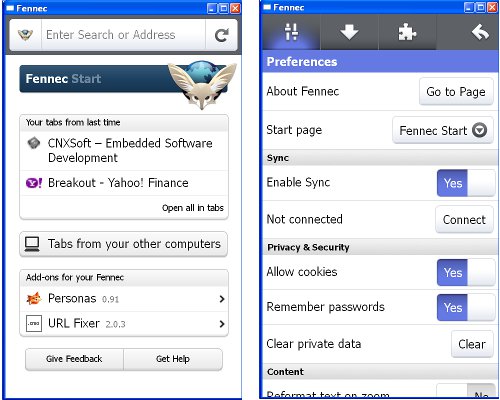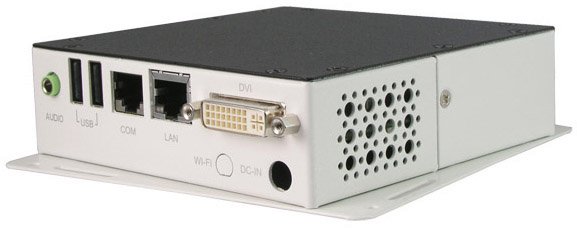Phytec announced the first system on module based on Texas Instruments OMAP4430. The phyCORE-OMAP4430 features up to 1GB LPDDR2 DRAM, 1GB NAND Flash, one USB Host, one USB OTG port, Ethernet, I2C Interface, DSI and HDMI video output and consumes a maximum of 3 Watts only. Here are the full specifications of the phyCORE-OMAP4430 computer module: Texas Instruments OMAP4430 @ 1GHz PowerVR SGX540 GPU 56 KB On-chip SRAM and 512 MB (default) or 1 GB LPDDR2 DRAM 128, 256, 512 MB (default) or 1 GB NAND Flash 4 (default) or 32 KB EEPROM 2 SD/SDIO/MMC Expansion slot 4 UARTs, 1 RS232, 3 I2C, 1 I2S and 2 SPI/SSP serial connections. 1 USB Host and 1 USB OTG ports. 10/100 MBit Ethernet 2 x DSI, 1 x HDMI video output ports up to 1080p encode/decode and Touch screen support DVI/HDMI, PWM, Camera, Keypad, JTAG and RTC Dimensions: 41 x 51 mm […]
C Code to get MAC Address and IP Address
Function in C to return the MAC Address:
|
1 2 3 4 5 6 7 8 9 10 11 12 13 14 15 16 17 18 19 20 21 22 23 24 25 26 |
/* Returns the MAC Address Params: int iNetType - 0: ethernet, 1: Wifi char chMAC[6] - MAC Address in binary format Returns: 0: success -1: Failure */ int getMACAddress(int iNetType, char chMAC[6]) { struct ifreq ifr; int sock; char *ifname=NULL; if (!iNetType) { ifname="eth0"; /* Ethernet */ } else { ifname="wlan0"; /* Wifi */ } sock=socket(AF_INET,SOCK_DGRAM,0); strcpy( ifr.ifr_name, ifname ); ifr.ifr_addr.sa_family = AF_INET; if (ioctl( sock, SIOCGIFHWADDR, &ifr ) < 0) { return -1; } memcpy(chMAC, ifr.ifr_hwaddr.sa_data, 6) close(sock); return 0; } |
Function in C to return the IP Address:
|
1 2 3 4 5 6 7 8 9 10 11 12 13 14 15 16 17 18 19 20 21 22 23 |
/* Returns the interface IP Address Params: int iNetType - 0: ethernet, 1: Wifi char *chIP - IP Address string Return: 0: success / -1: Failure */ int getIpAddress(int iNetType, char chIP[16]) { struct ifreq ifr; int sock = 0; sock = socket(AF_INET, SOCK_DGRAM, 0); if(iNetType == 0) { strcpy(ifr.ifr_name, "eth0"); } else { strcpy(ifr.ifr_name, "wlan0"); } if (ioctl(sock, SIOCGIFADDR, &ifr) < 0) { strcpy(chIP, "0.0.0.0"); return -1; } sprintf(chIP, "%s", inet_ntoa(((struct sockaddr_in *) &(ifr.ifr_addr))->sin_addr)); close(sock); return 0; } |
Setting Up an NFS Server in Ubuntu
You may need to setup an NFS server on Ubuntu to run and debug your program on your target platform or simply to share media files on the network composed of Linux clients. If you are using Windows clients, you would usually use SAMBA/CIFS, although it is possible to setup an NFS server in Windows as well using Windows Services for UNIX 3.5. Quick Guide to to setup an NFS server in Ubuntu without authentication. Install the required packages: # sudo apt-get install nfs-kernel-server nfs-common portmap Reconfigure and restart portmap: # sudo dpkg-reconfigure portmap # sudo /etc/init.d/portmap restart Edit /etc/exports: # sudo vi /etc/exports Add the directories to share with NFS and save the file, for example: /nfs 192.168.1.0/24(rw,no_root_squash,async) will give full read/write permissions to the nfs directory for computer in 192.168.1.0 subnet. Restart the NFS server: # sudo /etc/init.d/nfs-kernel-server restart and reload the configuration: # sudo exportfs -a The […]
Hercules eCAFE ARM Cortex A8 Netbooks running Linux
Hercules, a subsidiary of Guillemot Corporation, announced two new eCAFÉ netbooks based on Freescale i.MX515 @ 800 Mhz (ARM Cortex A8) that run a custom Linux distribution and feature a dipswitch for flipping to other user-loaded Linux or Android operating systems: eCAFÉ Slim HD – 229 USD: LED screen: 10.1 inch, 1024*600, high brightness Storage: 8Gb Flash (iNAND), extensible up to 72Gb ARM CortexTM A8 FreescaleTM i.MX515 @ 800 MHz processor RAM: 512 Mb WiFi N technology Battery: 2400 mAh (7.4V) for 4.5 hours’ battery life Comfortable “chiclet” keyboard with flat, separate keys – 88% of a standard keyboard 0.3MP webcam with built-in microphone Connections: 3x USB, 1x Headset, 1x Microphone, 1x LAN RJ45, 1x DC-in 12V, 1x External card reader: SD/MMC/SDHC, 1x Internal card reader: SD/SDHC DIP Switch Weight: 1.9lbs / 0.86 kg eCAFÉ EX HD – 269 USD: LED screen: 10.1 inch, 1024*600, high brightness Storage: 16Gb extensible […]
Firefox 4 for Android and Firefox Mobile for Computer
Mozilla has just released Firefox 4 for Android or Nokia N900 (Maemo) which is available for download at http://www.mozilla.com/en-US/mobile/download/ and on the Android Market. Have a look at the video below to see the main features of Firefox 4 Mobile such as multiple tabs, full screen browsing (no menu), panning and zooming, firefox sync to synchronize all your devices, spam filters, add-ons, personas and more. If you do not have an Android device or Nokia N900, you can still test if your mobile website works fine as Mozilla also provides Firefox for mobile to your desktop computer for Windows, MAC OS X and Linux. I’ve try it for Windows XP. There is no installer, after you download the file, simply extract the files in C:\Program Files for example, and then run C:\Program Files\fennec\fennec.exe to start Firefox 4 Mobile on your computer, it will open a 480×800 Window. Fennec is the […]
New Digital Media Processor: Conexant CX92755
Conexant announced a new single-chip media processor for multimedia display products such as digital signage, home automation/security and user interface control. The CX92755 is based on ARM™ Cortex-A8 processor and NEON™ single instruction, multiple data (SIMD) engine with Linux and Android development support. The highly integrated SoC also includes an advanced HD video codec and graphics processor, integrated L1 and L2 cache, a PCI Express™ interface and DDR3 memory, The CX92755 integrates peripheral functions including a Class-D amplifier with speaker and line-out, a microphone input, back-light regulator, power supply controller and touchscreen controller. The SoC also includes an embedded high-performance graphics processor, which supports display list processing, alpha blending, and color key control for advanced user interface operation and display effects. the CX92755 also support the major network connectivity standards such as Wi-Fi®, 3G, Bluetooth® and integrated Ethernet. The SoC also integrates Conexant’s HSSD/Smart DAA® (Direct Access Arrangement) interface, and […]
AMD G-Series based Digital Signage: Ibase SI-18
Ibase announced a digital signage player – the Signature Book SI-18 – based on the dual-core AMD G-Series T56N running at 1.6 GHz. The IBase SI-18 is currently sold with 2GB RAM and a 160GB 2.5″ HDD, but it can support up to 4GB of RAM and 1TB of disk storage. It also features DVI output, gigabit Ethernet, two USB ports, an audio jack, a serial port and a Mini PCI slot for Wi-Fi or Bluetooth support. The device weights 800g and just measures 125.5mm (W) x 125.5mm (L) x 36 mm (H). IBase claims it is the smallest x86 digital signage player in the world. Ibase SI-18 Digital Signage Player Here are Ibase SI-18 specifications: System Mainboard EB900 CPU Type AMD G-Series Dual-Core APU (Accelerated Processing Unit): T56N=1.6GHz @ 18W TDP CPU Package 413-BGA Chipset AMD A55E Controller Hub Memory DDR3-1066 Graphics ATi Radeon HD6310 series graphics processing system […]
Installing Linaro ARM Cross Toolchain on Ubuntu
You can easily install Linaro arm cross-compiler on Ubuntu 10.04 (Lucid), 10.10 (Maverick) and 11.04 (Natty) as follows: sudo apt-get install gcc-arm-linux-gnueabi This will install Linaro cross-toolchain version 4.4 on Ubuntu 10.04 and 10.10, and version 4.5 on Ubuntu 11.04. You can check the installation worked by checking the cross-compiler version jaufranc@CNX-TOWER:~$ arm-linux-gnueabi-gcc -v Using built-in specs. Target: arm-linux-gnueabi Configured with: ../src/configure -v –with-pkgversion=’Ubuntu/Linaro 4.4.4-14ubuntu4′ –with-bugurl=file:///usr/share/doc/gcc-4.4/README.Bugs –enable-languages=c,c++,fortran,objc,obj-c++ –prefix=/usr –program-suffix=-4.4 –enable-shared –enable-multiarch –enable-linker-build-id –with-system-zlib –libexecdir=/usr/lib –without-included-gettext –enable-threads=posix –with-gxx-include-dir=/usr/arm-linux-gnueabi/include/c++/4.4.5 –libdir=/usr/lib –enable-nls –enable-clocale=gnu –enable-libstdcxx-debug –enable-objc-gc –disable-sjlj-exceptions –with-arch=armv7-a –with-float=softfp –with-fpu=vfpv3-d16 –with-mode=thumb –disable-werror –enable-checking=release –program-prefix=arm-linux-gnueabi- –includedir=/usr/arm-linux-gnueabi/include –build=i686-linux-gnu –host=i686-linux-gnu –target=arm-linux-gnueabi –with-headers=/usr/arm-linux-gnueabi/include –with-libs=/usr/arm-linux-gnueabi/lib Thread model: posix gcc version 4.4.5 (Ubuntu/Linaro 4.4.4-14ubuntu4) You can also install the latest version 4.5 (recommended) on Lucid and Maverick: sudo add-apt-repository ppa:linaro-maintainers/toolchain sudo apt-get update sudo apt-get install gcc-4.5-arm-linux-gnueabi If you are using an ARM platform running Ubuntu 10.10 or higher, you could also use the native GCC compiler. sudo apt-get install […]










